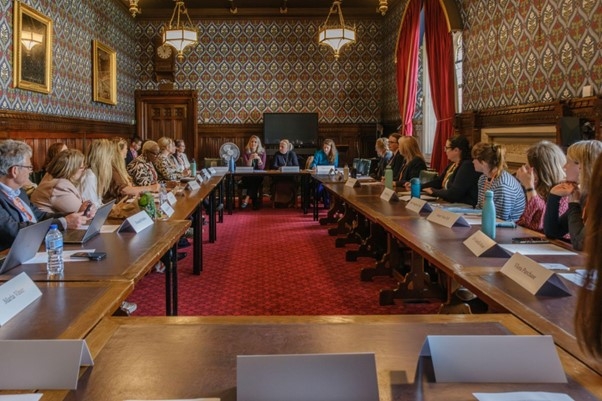Posted By: Amy Tubb
29th September 2025
3 minute read

In this guest blog, Laura Kyrke-Smith MP shares insights from her recent cross-party roundtable on perinatal mental health, exploring how the Government’s 10-Year Health Plan can deliver a decade of genuine progress for women, birthing people and families.
On Monday 15 September, I had the honour of co-chairing a roundtable on perinatal mental health alongside Michelle Welsh MP. The event brought together over 25 parliamentarians, NHS leaders, clinicians, charity representatives, and those with lived experience following the publication of the 10-Year Health Plan in July. I am grateful to everyone who took part — their expertise and personal stories shaped a powerful call for change.
The focus of our meeting was clear: how do we ensure that our Government’s 10-Year Health Plan delivers a decade of positive change for perinatal mental health? The Government has embarked on transformative work to improve the country’s health, and better perinatal mental health outcomes must be one test of the Government’s success.
Over the past decade, we have seen welcome progress. Specialist perinatal mental health services now cover more parts of the country, and mother and baby units have been expanded. But too many women, birthing people and families are still falling through the gaps. The postcode lottery remains stark: some areas have well-resourced perinatal mental health teams, while others rely on a single part-time specialist. Access is uneven, thresholds are arbitrary, and many people most in need never reach the right services at all.
We discussed the critical role of community and voluntary organisations. Groups like PANDAS provide safe spaces, peer support, and early interventions that can be life-changing. Yet many of these organisations face chronic funding insecurity. Their work is not a “nice to have” — it is essential, and it needs sustainable support.
Most importantly, lived experience voices were at the heart of our discussion. We heard moving testimonies from women who had been “bounced between services,” unable to find the help they needed. Some spoke of feeling mistrustful of services altogether, having been let down at their most vulnerable moments, contributing to their mental health challenges. They emphasised that families cannot wait. Action is needed.
These discussions generated a series of clear recommendations, which I have grouped below in line with the Government’s 10-Year Health Plan:
Finally, there was a clear consensus on the need to strengthen data collection and monitoring, enabling progress to be tracked nationally and systems to be held accountable for improving maternal mental health outcomes.
I have passed on these points directly to the Secretary of State for Health and Social Care, and the Minister for Mental Health. I know they share my determination to address the challenges and inequalities impacting perinatal mental health provision. I have also written to Baroness Amos, so that the contributions from the roundtable can be fed into her independent investigation into NHS maternity and neonatal care.
At its heart, this work is about saving lives, restoring trust, and making sure no woman or birthing person is failed because of where they live, the colour of their skin, their vulnerability or the complexity of their circumstances.
The MMHA would like to thank Laura Kyrke-Smith MP for her ongoing efforts to shape and improve perinatal mental health support for women and birthing people, and their families.